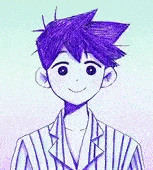|
Also, having answered all that, remember that thinking he understood all this bullshit and that any of it helps or means anything to Shinji is what got Kaworu killed. Don't lose sight of what's actually important! 
|
|
|
|

|
| # ? May 24, 2024 22:23 |
|
ImpAtom posted:There are interviews hinting at things in Eva 3.0 which make sense after the fact from before Rebuild 1.0 and 2.0 came out. It was pretty likely intended and the preview is just supposed to be Things that happened between the two movies. That or an elaborate joke. I'm going to be saying this a lot: a little of column A, a little of column B. I wonder if reading all this confused black bar poo poo and "getting it" is how tenured English professors feel. It's an incredibly smug feel. 
|
|
|
|
Khanstant posted:I saw the original series like 10 years ago, and I think both movies. I saw one of the rebuilds like a year ago or something. I know it is a major theme but I don't recall too much explanation going on for lots of things. Also, I saw it a decade ago. Still, I'm pro-LCL now, and I'll be pro-LCL tomorrow. I'm glad you took this one on the chin. Something I didn't see mentioned was that EoE's Instrumentality (we haven't had a proper explanation of Rebuild's yet) isn't the result of thinking, yes, it's humanity's next evolutionary step, or whatever. It is in a sense, although it's a sterile one - what's a great ocean of Tang ever going to do? But the reasons Shinji might decide to go with Instrumentality aren't positive. They're fear of other people, inability to socialise, and inability to cope with the pain of living with other people - it's pure escapism. But the worst reason is that Instrumentality means destroying yourself; you have to regard your whole life and everyone you know as meaningless. Shinji's last words in the series, when he rejects Instrumentality, are "I think I can learn to love myself." Instrumentality is a total inability to love yourself. abraxas posted:What's up with that huge rear end tower and the vertical tunnel connecting directly down to almost-Lilith and all the skulls and stuff? And why was the tunnel ALSO made out of weirdly semi-gooeyfied EVAs? I think we saw this shaft down to Terminal Dogma in the series once or twice. You've got to get down there somehow. quote:If I understood all this right at the end of the movie, it ALL perfectly worked how Gendo had it planned from the beginning? He planned the Third Impact and the spearing of 01 by Kaworu and then 14 years of Shinji sleeping and Misato defecting and creating WILLE and then a huge eyeless Rei head exploding blood all over him and THEN Fourth Impact not happening despite almost happening kind of like the Third one. Well, there seem to be quite a few acceptable outcomes, so it could be more a case of him realising he still has a good chance of getting what he wants. quote:What are the Gates of Guf and what did we see through them? I felt like it was really deliberately framed when they closed at the end because they lingered on them being open for so long and then bwoop they closed. All I saw was a lot of black and a white glowy thing in the middle, but then again this might be some spiritual reference again that I have no idea about. The Chamber and Doors of Guf are mentioned in the original series and EoE; the "storehouse" for souls waiting to be born. The Doors opened at the beginning of EoE-Instrumentality. The name is borrowed from Jewish mysticism. http://wiki.evageeks.org/Guf
|
|
|
|
Just finished watching 3.33. Now to wait another however many years for the last. I'm not going to pretend I understood half of what was going on there. Part of that is I haven't seen anything much Evangelion since watching 2.22 whenever it came out, and part of it was the usual Evangelion flying over my head thing. But it was a blast to watch. I don't know who came up with EVAs in space, but drat that was a good way to draw me in at the start. Anyway, I'm just getting my thoughts down about this before I read other impressions. Oh, and I'm glad that Beast Mode or whatever it was called wasn't just a one-off gimmick. Mari ended up being quite a fun character in the end, although most of that was probably all the ways she was annoying Asuka. And it was nice to find out that the few things I accidentally spoiled myself on weren't too terrible to know already. The main one was the time skip, and I'd forgotten all about that by the time it was revealed. That and the black Plugsuits, but that was fine too because I didn't know why they were significant until I watched it. And Asuka's hat I guess. And last thing, it's nice to see that some things never change with this series. Catastrophic, potentially world-ending event? Time for Ode to Joy! Now to see what people more knowledgeable about this series and the inspirations of it have to say. edit: right, think I've got a little bit more of a handle on it now. Just a little bit though. 
McDragon fucked around with this message at 00:47 on May 1, 2013 |
|
|
|
The Devil Tesla posted:Why would you watch BSG in order to get happy. Try like Gravity Falls or something. My girlfriend likes that show; I'm decidedly neutral on it.  About rewatching 3.33. I finally got it and I felt so realized when I could maintain what I said earlier: It's not so much "gently caress you, Shinji" (though there's a little of that) anymore, it's "Shinji, you're a massive, monumental fuckup and yes, it's your fault, though only partially. But now you have a second chance. DON'T. gently caress IT. UP. That or Anno will do whatever the gently caress he feels like with 4.0. I'm still holding out some hope. 
|
|
|
|
House Louse posted:But the reasons Shinji might decide to go with Instrumentality aren't positive. They're fear of other people, inability to socialise, and inability to cope with the pain of living with other people - it's pure escapism. But the worst reason is that Instrumentality means destroying yourself; you have to regard your whole life and everyone you know as meaningless. Shinji's last words in the series, when he rejects Instrumentality, are "I think I can learn to love myself." Instrumentality is a total inability to love yourself. In Kabbalistic terms Instrumentality happens a moment after you've solved that class of personal problems. That's also why in EoE Instrumentality "fails". It's like Shinji is not ready, and so the process doesn't go through. Again in Kabbalistic terms, that global merging doesn't happen because we're constantly pulled back by immediate necessities and desires. "Egoism", as self-focused love and desire, is what keeps us as singular entities and away from "god". So, in this perspective, Instrumentality is not "destroying yourself", but abandoning the worldy necessities, desire for money, power, social status and so on. Ultimately leading to the loss of individuality. So, even for Kabbalah, there's sacrifice involved in the process, but it's about sacrificing all that ballast that keeps us away from the "light". Self absorbed love is what makes one grasp power for himself and enslave everyone else, that's the apex of that trajectory. Thinking that your personal advantage is preferable to the advantage of a community. So from this perspective forcing Instumentality has no consequence, as it is shown in EoE. Because that kind of process has to be prepared beforehand. If Shinji is not ready for that kind of sacrifice then it means the "egoism" is still there, pulling him back to the previous state. And so the "evolution" won't go through even if triggered artificially, since Instumentality doesn't actually complement anything. This is the overall logic, and it applies perfectly, in its metaphoric meaning, to EoE. We'll see how they'll use this idea in these new movies. Abalieno fucked around with this message at 01:33 on May 1, 2013 |
|
|
|
Besides, that solution works in all possible levels of interpretation. The ending of the TV series represented the ideal of the story Anno wanted to tell. It represents Anno's wish and desire: that Instrumentality works and Shinji fixes his issues because the message of the series itself was understood. But then the sequel movies became for Anno a way to THINK on the series itself and its message. They become meta-commentary: whether or not the message actually was understood and worked. On BOTH levels, it didn't. The message failed if you think about the public's reaction (the message of the show). And then Anno realized that Shinji also wasn't ready for Instrumentality. He wasn't through his personal issues, as shown in EoE before Instrumentality. His character didn't grow, it actually regressed. Hence the acknowledgement that the TV series "happy end" on one side wasn't possible because rejected by the public, and then Anno made that into the truth of the story. As with the public, Shinji wasn't ready for Instrumentality. This because the whole point of Eva is: Anno = Shinji = public (or nerds/otakus who can identify with Shinji, see Tsurumaki who literally says "itís useless for non-anime fans to watch it") Or, if you want: God, Jesus Christ, and the Holy Spirit(LCL) Abalieno fucked around with this message at 01:50 on May 1, 2013 |
|
|
|
Abalieno posted:The ending of the TV series represented the ideal of the story Anno wanted to tell. It represents Anno's wish and desire: that Instrumentality works and Shinji fixes his issues because the message of the series itself was understood.
|
|
|
|
Abalieno posted:The ending of the TV series represented the ideal of the story Anno wanted to tell. It represents Anno's wish and desire: that Instrumentality works and Shinji fixes his issues because the message of the series itself was understood. But then the sequel movies became for Anno a way to THINK on the series itself and its message. They become meta-commentary: whether or not the message actually was understood and worked. edit: beaten by something similar.
|
|
|
|
I always read it as the instrumentality brain working out Shinji's problems so he can let go of his individual baggage and join the blob. But the other reading probably makes more sense.
|
|
|
|
Nope. In episode 26 Instrumentality is definitely successful. People clapping hands at the end. You can, if you want, REINTERPRET that ending with EoE in mind to try to make them the same, but it's extremely obvious that as far as episode 26 is concerned Shinji doesn't refuse anything and doesn't go against anything. Nor in the movie you see people coming up to congratulate for his choice. You need a giant hammer to put the movies and the TV series ending together. I know people desire this, but it's extremely obvious that Anno changed his mind between the TV series and the movies. Negating this would actually negating the interesting part in those movies.
|
|
|
|
Paracelsus posted:I'm not sure to what extent the Instrumentality seen in ep 26 is the same Instrumentality that EoE suggests, where everyone's identity would be dissolved. "I can learn to love myself and my life is worth living here" requires an "I" that the Tang End doesn't seem like it could support. Is he learning to love himself though? NGE's ending is way creepy, and getting external support from everyone isn't required for loving yourself. What makes those two episodes so interesting is the way that they blend psychological healing with this kind of sinister intent, causing you to question if this is the way things ought to be.
|
|
|
|
Abalieno posted:In Kabbalistic terms Instrumentality happens a moment after you've solved that class of personal problems. That's also why in EoE Instrumentality "fails". It's like Shinji is not ready, and so the process doesn't go through. That logic is hideous, though. It seems to rely on the unspoken assumption that individuals will never be good enough, never be able to love each other as the Other as well as they could if they abandoned that distinction. Community without ego isn't community, it's just a monad. I agree the logic of Kabbalah as you describe it applies to Evangelion pretty well, but it applies in an incredibly ironic and critical fashion. The only people who wish to climb the ladder of spiritual ascent are those so broken and selfish that they're incapable of seeing the value of the life they have. God's messengers, who yearn instinctively to return to their version of the "light," are equated with kaiju movie monsters. "Ode to Joy," a poem about man being united as if by magic, is sung as one friend murders another. I'm not even entirely sure I agree with your assessment of Shinji being not-ready; I think that what occurs throughout the original series is exactly the process of getting him ready, forcefully, against his will. All his attachments are stripped from him, screaming and bleeding and leaving him a worse person than he was. The very last thing he does before Instrumentality ends is let go of his mother ("Farewell"), and then when he's reborn on the shore the first thing he does upon seeing another person is to calmly, silently try to strangle her to death. He has to be reminded, almost accidentally, that she's human too before he stops. I suppose you could witness all of that and say, "Well, that just proves they're ALL not ready for the transcendent bliss awaiting them." But personally I think that's insane. Abalieno posted:Nope. In episode 26 Instrumentality is definitely successful. People clapping hands at the end. The only thing 25 and 26 say is "This is Instrumentality." Whether it's succesful or not is extremely open to interpretation, especially when you consider its similarity to all the other hallucinatory sequences in the original series. (Which often lie, disguise one character as another, or serve to guide Shinji towards some ulterior conclusion.) EDIT: Also episode 26 literally has a sequence where the narrator sits Shinji down and explains to him that barriers and limitations are the only things that make action and meaning possible, so there's that. Tuxedo Catfish fucked around with this message at 02:39 on May 1, 2013 |
|
|
|
Abalieno posted:You need a giant hammer to put the movies and the TV series ending together. I know people desire this, but it's extremely obvious that Anno changed his mind between the TV series and the movies. Negating this would actually negating the interesting part in those movies. Before we got EoE it's possible that we could have taken a different viewpoint on what exactly Instrumentality entailed, but after that film it's pretty clearly meant to be viewed as escapism. A rejection of self-worth and the barriers that make someone themselves; the loss of happiness with the gain of no longer being in pain or dealt with negative emotions. And that isn't at all what Shinji seems to comes to terms with in the end in either version.
|
|
|
|
McDragon posted:Just finished watching 3.33. Now to wait another however many years for the last. I just watched 3.33 today.....and I have to watch it couple more times in order to actually understand part of it. I just find that 3.33 is much more confusing than 1.11 and 2.22. At least it is close to the ending: One more movie  . I am actually kind of interested in the new (or semi-new) eva shown in the preview, half unit-02, half unit-08 . I am actually kind of interested in the new (or semi-new) eva shown in the preview, half unit-02, half unit-08
|
|
|
|
Tuxedo Catfish posted:The only thing 25 and 26 say is "This is Instrumentality." Whether it's succesful or not is extremely open to interpretation, especially when you consider its similarity to all the other hallucinatory sequences in the original series. (Which often lie, disguise one character as another, or serve to guide Shinji towards some ulterior conclusion.) Nope. The idea in 26 is that Instrumentality is successful. The idea in EoE, at the very least, is that Instrumentality is artificially forced by Seele, and then disrupted by Shinji. You can then "retcon" 26 saying that 26 shows what happened in EoE. But this idea wasn't part of the original intent with the show, and the result of Anno's further elaborations and personal experience. To assume that Anno didn't change his mind and wasn't affected by the reaction of the public (and so putted all that in his work on EoE) is about NEGATING the only absolute certainty about all this. We know Anno had a breakdown after he put everything in the TV show, and we know that his stance changed greatly afterwards. If your theory doesn't acknowledge how much Anno changed in the process then it's like studying classic literature without knowing anything about history, cultural context and everything else. This refusal on Shinji's part is non-existent in the TV series. While it is obvious in EoE. You can interpret it how you want, but it is a fact that the element is present in EoE and absent in 26.
|
|
|
|
What are you basing all of that on? Also please address this: quote:EDIT: Also episode 26 literally has a sequence where the narrator sits Shinji down and explains to him that barriers and limitations are the only things that make action and meaning possible, so there's that. And as long as we're talking about Anno's intent for the show (there is no ugh big enough for letting authorial intent dictate interpretation, but as long as we're playing this game) -- Anno claims he wrote the show "without theory" and was constantly revising the script as he went. EDIT: There's also another article that says EoE is based on scripts that Anno had already written, but which were rejected by the TV network: http://www.evaotaku.com/omake/anno.html Tuxedo Catfish fucked around with this message at 03:05 on May 1, 2013 |
|
|
|
Abalieno posted:Nope. The idea in 26 is that Instrumentality is successful. The idea in EoE, at the very least, is that Instrumentality is artificially forced by Seele, and then disrupted by Shinji. You can then "retcon" 26 saying that 26 shows what happened in EoE. But this idea wasn't part of the original intent with the show, and the result of Anno's further elaborations and personal experience. Just because the TV series and EoE don't mesh with each other doesn't mean they have the exact opposite outcomes. Everything in episodes 25 and 26 are about understanding yourself as an individual and accepting your relationships to others in that context. It's all about the exact opposite mindset behind Instrumentality. The roughly sketched sequence Tuxedo Catfish brings up is the most blatant indicator of why Shinji isn't in the process of accepting Instrumentality.
|
|
|
|
I would certainly say that the fan backlash, among many many other things, certainly were a contributing factor to the tone of EoE. The absurd number of elements that came together to make this story is probably the most fascinating part of Evangelion to me. The depression, the budget issues, the the fan outcry and corresponding response, the (at the time) unconventional approaches to analyzing its characters and the inherit postmodernisms. It's just so absurd how all of that came to be in one show/movie, and it's hard to think of many other anime that underwent such a trial by fire approach and still came out of the other side.
|
|
|
|
Nate RFB posted:It's just so absurd how all of that came to be in one show/movie, and it's hard to think of many other anime that underwent such a trial by fire approach and still came out of the other side.
|
|
|
|
I don't see how you can say Instrumentality was successful in the TV series and that Shinji did nothing to refuse it. I mean the ending has the scene crack into pieces (the scene in which he was sitting alone in an empty room) and behind it we see all the important people in his life (other people, not an amalgamation of human existence). Shinji confronting his own sense of self and validating his individuality and self-worth and maybe even learning to love himself seems like flat-out rejection of instrumentality, I think. He all at once accepts responsibility for his own life and the consequence it has on those around him.
|
|
|
|
HoneyBoy posted:I don't see how you can say Instrumentality was successful in the TV series and that Shinji did nothing to refuse it. I mean the ending has the scene crack into pieces (the scene in which he was sitting alone in an empty room) and behind it we see all the important people in his life (other people, not an amalgamation of human existence). Shinji confronting his own sense of self and validating his individuality and self-worth and maybe even learning to love himself seems like flat-out rejection of instrumentality, I think. He all at once accepts responsibility for his own life and the consequence it has on those around him. No. It's a rejection of instrumentality as it is described in EoE, but someone who doesn't watch the movie doesn't have any idea of "rejection". This is a rationalization you make AFTER watching the movies. If you don't see the movies the message is that what is being shown is exactly how Instrumentality works. It's the idea of what Instrumentality actually IS that changes between TV and movies.
|
|
|
|
I definitely think 3.0 is the weakest of the 3 movies so far. I kind of like the gutsy decision to go completely off the rails, it's nice to have 0 scenes rehashed from the series and be in 100% new territory. Unfortunately it feels like the movie was a whole lot of nothing in the end, a hell ofa lot of flash but very little substance. I was left feeling like the plot had hardly progressed at all. I think the main problem was that it was a little too Shinji-centric, we didn't have any scenes with the other characters interacting excapt for a few brief Gendo - Fuyutski and Asuka - Mari scenes. Having 2 hours of Shinji getting the poo poo kicked out of him is not interesting, you need a little levity from the other characters to break it up a bit and make it bearable. The lengths they go to to set Shinji up in this to stomp all over him and say "Haha he got screwed again!" was just eyeroll territory. We get it, being Shinji is suffering, can you please make the next movie a bit more substantial than "Shinji sucks and makes bad decisions a lot - The Movie" please? I will say, sparseness of the plot aside, the visuals were spectacular, those panning shots of the apocalyptic landscape were chilling. Zahki fucked around with this message at 04:48 on May 1, 2013 |
|
|
|
Abalieno posted:No. It's a rejection of instrumentality as it is described in EoE, but someone who doesn't watch the movie doesn't have any idea of "rejection". This is a rationalization you make AFTER watching the movies. If you don't see the movies the message is that what is being shown is exactly how Instrumentality works. Okay, but you could say this about anything at literally any point in the series. Of course you can't fully judge a concept you haven't been fully exposed to yet. If you stopped watching the show at episode 6, you might reasonably conclude that Second Impact really was the result of an asteroid hitting the planet. I admit this analogy is slightly absurd because EoE presents itself as "25' and 26'" which is bit different than new sequential episodes, but nothing in the text itself explains whether it is a contradiction, a complement, an addition, etc. Referring to Anno changing his mind is pointless both because of the death of the author, and because even if you privilege authorial intent, Anno changed the story constantly throughout its run, and because there's evidence that suggests EoE's script predates the backlash. Anyways, if you want to consider the series minus EoE a complete text and argue about that instead of the whole franchise, that's fine. If that were the case I would probably say that Evangelion doesn't mesh very well with Kabbalistic principles at all, because Shinji's journey consists of shedding attachments and becoming more and more miserable until an introspective, arguably mystical experience shows him the value of himself and others, with the final scene transforming (or perhaps revealing?) people who formerly hurt and confused him as well-wishing friends. Tuxedo Catfish fucked around with this message at 05:14 on May 1, 2013 |
|
|
|
Tuxedo Catfish posted:Anyways, if you want to consider the series minus EoE a complete text and argue about that instead of the whole franchise, that's fine. If that were the case I would probably say that Evangelion doesn't mesh very well with Kabbalistic principles at all, because Shinji's journey consists of shedding attachments and becoming more and more miserable until an introspective, arguably mystical experience shows him the value of himself and others, with the final scene transforming people who hurt and confused him into well-wishing friends. If you pare away everything that makes them unique, this is pretty much the core of all occult systems. The initiate undergoes a series of increasingly difficult and harrowing trials followed by a temptation that must be resisted (in the series being Kaworu's unconditional, but ultimately hollow and inhuman love) before plunging into an abyss of ego destruction. The test is the recreation of the self and emergence from the other side. Eva adopts the trappings of Western Judeo-Christian mystical systems, but also subtly identifies them with more Eastern motifs through the visuals, especially in EoE. From that perspective, Instrumentality isn't the end goal of the psuedo-mystical ritual enacted in the series, but the emergence from the other side. Hence "death and rebirth" and "the fate of destruction is also the joy of rebirth". You're not going to find a direct correlation because they found things like the Tree of Life and whatnot in a book, but they clearly read the book and took some motifs and ideas from it, rather than just using the images as completely meaningless window dressing as is commonly argued.
|
|
|
|
The Riddle of Feel posted:If you pare away everything that makes them unique, this is pretty much the core of all occult systems. The initiate undergoes a series of increasingly difficult and harrowing trials followed by a temptation that must be resisted (in the series being Kaworu's unconditional, but ultimately hollow and inhuman love) before plunging into an abyss of ego destruction. The test is the recreation of the self and emergence from the other side. Well, that's fine then. I don't know nearly enough about Kabbalah to compare it directly to anything, I'm just going by Abalieno's description which seems to lack the crucial "recreation of the self" part. (Or perhaps I'm misinterpreting him with respect to that.) Looking at EoE in that light makes it seem almost like a clash of contradictory occult systems, where one (SEELE's Instrumentality) advocates a final return to the source and the other operates more like a mystery cult (Yui's Instrumentality), with Shinji caught in the middle and ultimately siding with his mother. EDIT: It also makes the "Yui planned everything" theory a lot kinder to her, since in that light she's basically protecting her child (and by extension, all human life) from SEELE's death wish. She's still kind of nuts, but even traumatizing him with the Contact Experiment makes a certain kind of twisted sense if it is what she says it is: showing her son her hope for the future. ... god, it almost even makes me feel sorry for Gendo. 
Tuxedo Catfish fucked around with this message at 05:56 on May 1, 2013 |
|
|
|
Tuxedo Catfish posted:Well, that's fine then. I don't know nearly enough about Kabbalah to compare it directly to anything, I'm just going by Abalieno's description which seems to lack the crucial "recreation of the self" part. (Or perhaps I'm misinterpreting him with respect to that.) The goal of Kabbalah (and it's really a goal) is reunion with God. So there's absolutely no recreation of the self in Kabbalah. It's not about individuality at all. In fact the fascinating thing about Kabbalah is that it considers physical reality completely "fake". It's like the Matrix. Everything you see is an illusion. I've given this link before: http://www.perceivingreality.com/ (btw, tell me if this video doesn't look very like episode 26, and you're seeing Kabbalah Instrumentality) Which is also why Kabbalah doesn't tell you to pray, or to eat or not eat certain things, or anything else. Physical reality for them is pointless, so they are uninterested in it. Obviously Kabbalah is only useful to interpret Evangelion when things are similar. In some cases they are, in others it's obvious that Anno turned things in other directions. So the Kabbalistic Instrumentaly doesn't have to be the same. I simply used it to explain those parts that make sense in Eva. Above I wrote the truth of Eva, which is the three centers of Anno, Shinji and public. Everything else is consequence. Abalieno fucked around with this message at 06:25 on May 1, 2013 |
|
|
|
Abalieno posted:The goal of Kabbalah (and it's really a goal) is reunion with God. So there's absolutely no recreation of the self in Kabbalah. It's not about individuality at all. You did; I didn't remember it was you. I do however remember being really creeped out by it.
|
|
|
|
Tuxedo Catfish posted:You did; I didn't remember it was you. Well, it's not like episode 26 isn't creepy. But then you have to consider this is a very "consolatory" vision (as pretty much all religions). In fact I don't personally believe in Kabbalah because I'm sure the truth is much, much, much worse (and in this case I'd point you to R. Scott Bakker books, but it's not pertinent here, though there's a thread in this forum, in the book section).
|
|
|
|
Oh, just saw your edit:Abalieno posted:(btw, tell me if this video doesn't look very like episode 26, and you're seeing Kabbalah Instrumentality) I'm not entirely sure what we're arguing about any more, so here's my take: Obviously Evangelion draws on Kabbalistic symbols; that it has similar themes isn't much of a stretch. No disagreement here. Evangelion draws the opposite conclusion of that video. This is true regardless of whether we're talking about episode 26 or EoE; episode 26 presents a return to egoism in triumphant, upbeat terms and EoE is much more brutal about the remaining difficulties, but in neither case is the return to individuality a failure. Tuxedo Catfish fucked around with this message at 06:54 on May 1, 2013 |
|
|
|
Tuxedo Catfish posted:Evangelion draws the opposite conclusion of that video. This is true regardless of whether we're talking about episode 26 or EoE; episode 26 presents a return to egoism in triumphant, upbeat terms and EoE is much more brutal about the remaining difficulties, but in neither case is the return to individuality a failure. The style and point of Instrumentality are similar. That video uses similar patterns than those used in episode 26. Some of the language is similar. Obviously the final goal is thematically different because the point of Evangelion, very obviously, isn't spirituality. Or we would argue that Eva was built with proselytism in mind. "Return to individuality" in EoE is a failure simply because it doesn't accomplishes Instrumentality. It's not a moral judgment, it's simply a matter of fact that Shinji refused it. In episode 26 Shinji went all the way through, because Instrumentality at that point was merely the positive process. The negative/amoral theme of losing individuality is something new in EoE, it wasn't there before.
|
|
|
|
So I just watched Rebuild 1.11, 2.22 and 3.33, the latter two for the first time, and... Now, with the immediate reaction done: Holy hell, Kaworu is pretty much the creepiest thing. So the world's been taking a poo poo on you throughout, oh, your entire life, you've never been able to get through to anyone, your mistakes have caused monumental damage... and then you meet this guy who genuinely not just wants to be your friend but literally has a single purpose to his existence - that of making you happy. He's honest to you, in fact he never does anything to break your trust even the tiniest bit. He teaches you new stuff, he helps you grow as a person, he does things without asking for anything in return. Also he regularly does weird stuff that should make you wonder exactly how human he is, like walking around without protection in hazmat suit weather, or taking off that explosive collar of yours like it wasn't even a thing - but you don't worry because, hell, finally someone gives a poo poo. Somehow the fact that it was pretty clear there would not be a sudden but inevitable betrayal made it worse. I don't know, maybe I was just in a particularly depressed mood after the first two films, but thinking about a character so unlike humans just because of how genuinely he loves them (and one in particular) gave me the shivers.
|
|
|
|
How do you know it didn't? Instrumentality is the process, not the result.
Tuxedo Catfish fucked around with this message at 07:54 on May 1, 2013 |
|
|
|
Tuxedo Catfish posted:How do you know it didn't? Instrumentality is the process, not the result. As I said, the movie didn't give me this idea. Shinji stops the process (because not ready). I don't think the stopping of the process was intended by it. In the context of EoE Instrumentality doesn't happen. Even the wiki says something like this: quote:In Instrumentality, the flaws in every living being would be complemented by the strengths in others, thus erasing the insecurities in people's hearts. Since it doesn't happen, it means that Instrumentality wasn't completed. So it "fails", I say.
|
|
|
|
Where is that definition first introduced, though? Does it predate EoE? If you're going to quote Evageeks, the entry in its entirety is: quote:As a result of Third Impact, all Lilin souls would be gathered into Lilith's Egg and united as one being. This would create an existence where nobody existed singularly, but merely as part of the whole. In Instrumentality, the flaws in every living being would be complemented by the strengths in others, thus erasing the insecurities in people's hearts. If there's an earlier, conflicting definition of Instrumentality from the series, please remind me. Tuxedo Catfish fucked around with this message at 08:20 on May 1, 2013 |
|
|
|
Tuxedo Catfish posted:Where is that definition first introduced, though? Does it predate EoE? Well it happens for an indeterminate amount of time in EoE until Shinji and Asuka are able to will themselves back. Given both endings though I don't see Instrumentality as being the finale for either since in both instances Shinji decides against it, via different reasoning/methods. edit: Right, like you said, it doesn't stick.
|
|
|
|
HoneyBoy posted:Well it happens for an indeterminate amount of time in EoE until Shinji and Asuka are able to will themselves back. I'm saying an awful lot that I immediately reconsider because it's like 3 AM and putting it all in order is a pain. But the gist of it is that episodes 25 and 26 are incredibly vague and I don't think EoE can be said to definitively contradict them. Tonally, sure, but not mechanically / literally because the whole point of episode 25 and 26 is that they abandon the mechanical / literal stuff.
|
|
|
|
I just finished watching 3.33 for the first time and am going to catch up on this thread before possibly getting into any discussion, but I did want to echo this:DerLeo posted:their sound design just floored me. It's just such a beauty to listen to, everything sounds like it's coming from massive metal monsters when it needs to. The mix is indeed loving great. I was drooling over it start to finish. The first two films, especially 2.22, sounded nice as well, but 3.33 is a clear improvement.
|
|
|
|
Abalieno, I think you're grossly misinterpreting the ends of both the series and EoE itself and their relationship to each other. Do you remember that your first Kabbalahpost relied on misidentifying Lilith as Adam?
|
|
|
|

|
| # ? May 24, 2024 22:23 |
|
Nate RFB posted:Rewatching the end of 2.22, yeah a lot of this doesn't make sense at face value. You have to make numerous assumptions and mental gymnastics to make it work. Maybe the scene after the credits didn't actually happen, so it's not representative of what led into 3.33. After all the preview that immediately followed was bogus as well. I see the preview at the end of 2.22 as the 14 year skip of sorts, so its the cliff notes for the time skip I guess? The preview mentions Unit 06 descending into terminal dogma where its found in 3.33 replacing the head of lilith along with 2 spears, then the quickening of Unit 08, which is now Mari's plugsuit number in 3.33. Then there's the fact that there's 2 spears of the same kind in the corpse of lilith, when Shinji broke the spear into 2 in what...Episode 26? EoE? Can't remember which. Also the fact that once again lilith is headless after a failed impact might mean something as well. Or doesn't. Who knows. :evangelion:
|
|
|




















